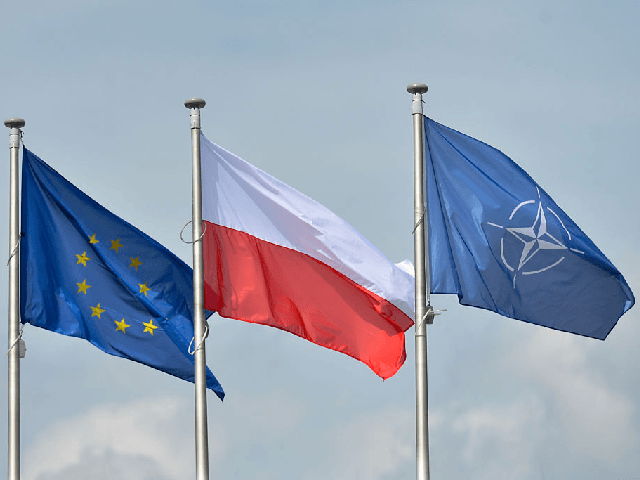Last Wednesday, in his ‘State of the Union’ address, the President of the European Commission Jean-Claude Juncker attempted to put forward an upbeat vision of the EU.
Largely ignoring the Brexit-sized elephant, Juncker instead chose to stick to his tried and tested approach: “The European project continues. Let’s choose to look forward. Be positive.” Get Britain Out questions whether simply ignoring such a major setback is a wise move, but it seems Juncker is determined to continue to try and put a positive spin on things. No matter what the question is, the answer for Juncker is always the same – more Europe.
Aside from his rather bizarre demands for greater positivity, Juncker’s speech also contained a number of interesting proposals – in particular concerning the issue of defence. Rather surprisingly, Juncker started with a rather frank admission, saying: “Europe can no longer afford to piggy-back on the military might of others.” This is undeniably true.
Examining the funding of NATO, the transatlantic alliance which has ensured peace in Europe for half a century, the freeloading of European nations swiftly becomes apparent. The US (which covers around 72% of total NATO spending) spends 3.6% of its total economic output on defence, in stark contrast to Germany, the largest European economy, which spends under 1.2% of its GDP. The UK is not much better, only matching the NATO minimum defence spending requirement of 2% through some rather creative accounting.
Interestingly Juncker chose not to thank the US for its generosity, instead he chose to praise France.
This is no accident. The European Commission has long supported the French and German desire to dissolve NATO in favour of a central European alliance. Juncker’s demand to stop piggy-backing off the US is not a call for European nations to meet their commitments to NATO, it’s simply the EU’s desire to cut Europe’s military ties with America in favour of a single European army under the command of the EU.
The prospect of a ‘European Army’ directed from Brussels should elicit a shudder from any right-minded individual. When we look at the two major projects of the European Union – the Euro and the Schengen Area – it would be difficult to say either have been a success.
Both are increasingly regarded as unmitigated disasters, and this begs the question: If the EU can’t even sort out a suitable single currency for Europe can it really be entrusted with its armies?
It would be very easy for the UK to wash its hand of this mess. This was why one of the many reasons people voted for Brexit was to ensure our British armed forces are not co-opted into a European army. But Brexit does not mean turning our back on our neighbours.
There is a major divide within the EU. On one side there are the Western European states of Italy, Germany and France with a desire for deeper integration and a European Army. On the other are numerous eastern and northern European states who want to return powers back to their nations and are nervous at the prospect of a single European army.
Considering their geographical location, it is not surprising many of these Eastern European states oppose the French, German and Russian attempts to dissolve NATO. The EU’s dithering in the face of the Russian annexation of the Crimea – a conflict driven by the EU’s wooing of Ukraine to Russia’s predictable displeasure – has hardly assured Eastern European leaders the EU can provide adequate military leadership.
The UK should also seek to expand the scope and focus of NATO. The founding aim behind NATO was to protect Western Europe from the USSR. Since the latter’s collapse we have seen a resurgent Russia on Europe’s eastern border; an increasingly aggressive China in the Far East and a continually turbulent Middle East.
It is of vital importance NATO undergoes a significant rethink and adjustment. NATO should consider expanding to include nations outside Europe and North America in order to be better suited to deal with conflicts across the globe. Those European nations who do not meet their defence commitments should have their membership suspended. Those who wish to entrust their armed forces to the EU should be allowed to do so, but with the clear consequence of the termination of their NATO membership and support.
Brexit presents a major opportunity for the United Kingdom to take the lead. Since the end of the Cold War NATO has lost a great deal of its defence capabilities. Last year General Petr Pavel, the Czech chairman of NATO’s Military Committee, warned Russia could overwhelm the Baltic states in just two days – with little resistance.
This week General Sir Richard Barrons, the former chief of Joint Forces Command, has revealed how NATO currently has no effective plan for protecting Europe in the event of a Russian invasion.
By taking a greater role in NATO we can prove to the United States that parts of Europe do appreciate the considerable investments they have made on our behalf. Brexit can be the start of the renewal of NATO, and the sooner we Get Britain Out of the EU, and get on with it, the better.
Jayne Adye is the Director of cross-party, grassroots Eurosceptic group Get Britain Out

COMMENTS
Please let us know if you're having issues with commenting.